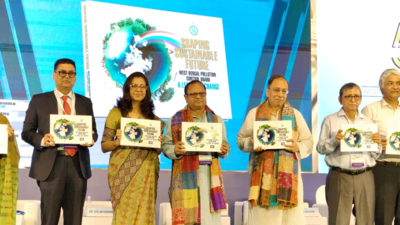- News
- India News
- Rising Heat Index in Bengal escalates health issues, warn experts
Trending
Rising Heat Index in Bengal escalates health issues, warn experts

The increasing heat index during summer days in Bengal has led to a manifold rise in cases of hypertension, heart diseases, and abdominal pain, stated Purnamita Dasgupta, an IPCC author and chair in environmental economics at the University of Delhi. Speaking at the 50th-anniversary event of the West Bengal Pollution Control Board, Dasgupta emphasized the health impacts of climate change in her keynote speech.
Heatwaves and Cyclones on the Rise
"Bengal, due to its geographic location, is among the most vulnerable states in India," said Dasgupta. "The number of heatwave days and the frequency of cyclones have increased tremendously." Dasgupta and her team analyzed morbidity and mortality data in Bengal, revealing a significant correlation between rising temperatures and health complications.
Air Pollution and Climate Change
"The study revealed significant amounts of pollutants, mainly black carbon or soot particles, arriving from Kolkata and the entire Indo-Gangetic Plain (IGP) region, are deteriorating the Sundarbans' air quality and affecting its ecosystem," Chatterjee added.
Water Resources Under Stress
Kalyan Rudra, chairman of the West Bengal Pollution Control Board (WBPCB), addressed the serious stress on Bengal's water resources due to increasing demand and wasteful practices. "With the ever-growing population, per capita water availability has plummeted from 5,177 cubic meters in 1951 to 1,465 cubic meters in 2025," Rudra noted.
Since the mid-1960s, India has shifted from dry crops to more water-intensive varieties, leading to overexploitation of groundwater and contamination of the food chain through indiscriminate use of chemical fertilizers and pesticides. Rudra emphasized the need for sustainable water management practices, stating, "Harnessing every drop of rainwater is a national priority. We should focus on localized, decentralized water resource management, which is cost-effective and encourages community participation."
International Collaboration and Future Outlook
Bangladesh Deputy High Commissioner in Kolkata, Andalib Elias, echoed Rudra's concerns, highlighting the disproportionate impact of climate change on Bangladesh. "Our contribution to global greenhouse gas emissions is negligible, yet we bear the brunt of climate change the most. With the current rate of warming, it's not far when at least one-third of our country will go underwater," Elias warned.
Elias and Rudra both stressed the importance of Indo-Bangladesh collaboration in research and data exchange to combat the effects of climate change. They advocated for international support through the loss and damage fund to protect vulnerable regions like the Sundarbans.
Rudra concluded his remarks by quoting ecologist Hubert Reeves: "We're at war with nature. If we win, we're lost." This sentiment underlined the urgent need for sustainable practices and resilient economic activities to safeguard both human health and the environment in the face of climate change.
Heatwaves and Cyclones on the Rise
"Bengal, due to its geographic location, is among the most vulnerable states in India," said Dasgupta. "The number of heatwave days and the frequency of cyclones have increased tremendously." Dasgupta and her team analyzed morbidity and mortality data in Bengal, revealing a significant correlation between rising temperatures and health complications.
Air Pollution and Climate Change
Abhijit Chatterjee of the Bose Institute highlighted the dual threat posed by air pollution and climate change. "The sources of both air pollution and climate change are the same. Fighting air pollution proves beneficial for mitigating climate change," he explained. Chatterjee's study indicated that air pollution is increasingly threatening the mangrove ecosystem of the Sundarbans in West Bengal, which acts as a natural barrier protecting Kolkata from extreme weather.
"The study revealed significant amounts of pollutants, mainly black carbon or soot particles, arriving from Kolkata and the entire Indo-Gangetic Plain (IGP) region, are deteriorating the Sundarbans' air quality and affecting its ecosystem," Chatterjee added.
Water Resources Under Stress
Kalyan Rudra, chairman of the West Bengal Pollution Control Board (WBPCB), addressed the serious stress on Bengal's water resources due to increasing demand and wasteful practices. "With the ever-growing population, per capita water availability has plummeted from 5,177 cubic meters in 1951 to 1,465 cubic meters in 2025," Rudra noted.
Since the mid-1960s, India has shifted from dry crops to more water-intensive varieties, leading to overexploitation of groundwater and contamination of the food chain through indiscriminate use of chemical fertilizers and pesticides. Rudra emphasized the need for sustainable water management practices, stating, "Harnessing every drop of rainwater is a national priority. We should focus on localized, decentralized water resource management, which is cost-effective and encourages community participation."
International Collaboration and Future Outlook
Bangladesh Deputy High Commissioner in Kolkata, Andalib Elias, echoed Rudra's concerns, highlighting the disproportionate impact of climate change on Bangladesh. "Our contribution to global greenhouse gas emissions is negligible, yet we bear the brunt of climate change the most. With the current rate of warming, it's not far when at least one-third of our country will go underwater," Elias warned.
Elias and Rudra both stressed the importance of Indo-Bangladesh collaboration in research and data exchange to combat the effects of climate change. They advocated for international support through the loss and damage fund to protect vulnerable regions like the Sundarbans.
Rudra concluded his remarks by quoting ecologist Hubert Reeves: "We're at war with nature. If we win, we're lost." This sentiment underlined the urgent need for sustainable practices and resilient economic activities to safeguard both human health and the environment in the face of climate change.
End of Article
FOLLOW US ON SOCIAL MEDIA










